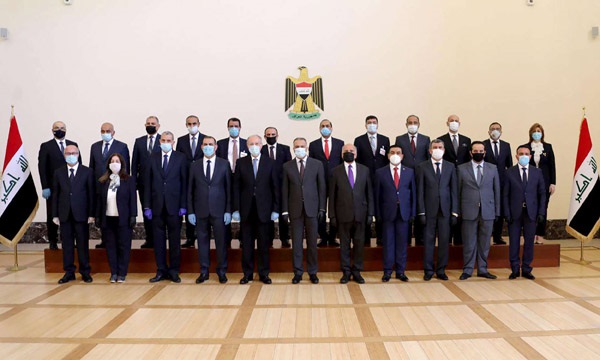AhlulBayt News Agency (ABNA): Three weeks after the parliamentary election results, coalition making to form a new government remains in ambiguity and observation of the process of talks suggests that dialogue is moving ahead sluggishly. This is while the protests to the results still unfold, making it difficult to rely on the published results. After all, any possible change in the results after manual count certainly affects the political negotiations.
However, after last week's Shiite Coordination Framework (SCF) rejection to participate in cabinet talks, it now appears that Muqtada al-Sadr, whom all eyes are on his actions and movements as the leading winner of the election to form a majority coalition, by announcing his readiness to form an inclusive government has sent a reassuring message and a sign of good faith by deciding to share power with other parties.
In a tweet on Sunday outlining the form of the next government, the Shiite leader announced his intention to form a national majority government, noting that he had no differences with other political factions except on "domestic and foreign reforms."
“It should not be said that I have a disagreement with the political blocs except for domestic and foreign [policy] reforms and the issue of the difference between patriotism and dependence,” part of his tweet read.
His tweet added that there are no differences with anyone except for the love for the homeland, and the first thing that should be done for the country in the future is for the government to be a “national majority.”
"There should be two factions in the parliament: The reformist side - which forms the government and carries out reforms at all political, governmental, service, and diplomatic levels and the opposition side,” his tweet which was in the form a photo statement read.
Best scenario
What drives not only al-Sadr but also other political groups towards the formation of an inclusive government, in addition to the outcome of the elections, are undoubtedly the challenges that the future government and the political system in general are facing.
The vote results showed that no group can independently form a majority government.
The Sadrist Movement is currently leading with 73 out of the 329 seats, followed by Parliament speaker Mohammed al-Halbousi-led Progress Coalition with 37 seats. The "Rule of Law" coalition led by ex-PM Nouri al-Maliki came third with 34 seats and the "Kurdistan Democratic Party (KDP) with 33 seats came fourth.
Mohammad al-Sayhoud, of Rule of Law coalition, commented on al-Sadr statement, saying that the Shiite forces are divided from within, and none can agree with other political factions for a majority government. In other words, the Shiite Coordination Framework which has roughly 90 seats cannot coalesce with the Kurds and Sunnis to form a cabinet without Sadrist Movement as cannot the latter.
“Here is what al-Sadr proposed: The best scenario is a government of majority,” al-Sayhoud went on, adding that with al-Sadr proposal winning welcome, it is the duty of the Shiite factions, which are the SCF and the Sadrist Movement, to form a majority cabinet. “And this will facilitate formation of government that will implement the reform plans,” he continued.
Also commenting on the issue, Riyadh al-Awadi, of National Wisdom Movement, said that what al-Sadr raised was the roadmap of the National Wisdom Movement before 2018 developments which “is the best way for right management of the government based on a successful formula.”
“Al-Sadr’s tweet seems to send assuring messages because it states that regardless of the size of each coalition, it cannot form a government alone,” al-Awadi held.
On the other hand, the coalition government will have more power to face the challenges the Iraqis are grappling with after the elections, the most important of which is the difficult economic conditions that Iraqis are suffering from.
But there are other important challenges, especially in terms of reviving the national spirit of Iraqis and national trust in the politicians. Decreased voter turnout sends a message of declining public confidence in politicians to solve problems, and their reluctance to vote suggests that the political process may lose its social legitimacy in the future.
Awaiting a message declaring PM al-Kadhimi dismissal
An informed source in the SCF told Iraq’s Shafaq News that Shiite body is waiting for more reassuring messages from al-Sadr, the most important of which is dismissing Prime Minister Mustafa al-Kadhimi from the list of candidates for the post and accepting talks to reach an agreement on an agreed-upon figure.
The protests that sparked against deteriorating living conditions and public services and led to the resignation of government of Prime Minister Adel Abdel al-Mahdi has made the government formation in Iraq an intricate job. The solution was sought in giving the post to the independents or liberals. But PM al-Kadhimi’s views over the past two years proved to be on a collision course with a major part of the factions present in the cabinet. Al-Kadhimi’s interim government was formed in such environment after al-Mahdi resignation. His failure to solve the economic challenges, improve the public services, and most importantly sluggish implementation of a parliament law calling for expulsion of the foreign occupation forces from the country made his premiership continuation predictably facing opposition.
All aspects considered, the path to a new government is not yet smooth as al-Sadr, despite declaration of readiness to engage in talks with other groups on a new government, still insists on implementing his largely-challenging plans, for example full ignorance of the ratio formula in appointment of ministers.
/129
source : Al Waght News
Wednesday
3 November 2021
4:45:05 AM
1194863

Three weeks after the parliamentary election results, coalition making to form a new government remains in ambiguity and observation of the process of talks suggests that dialogue is moving ahead sluggishly.
